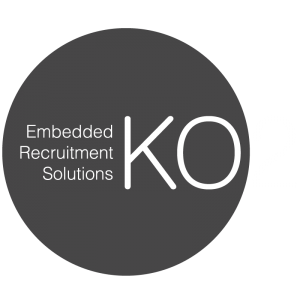The myth of robots and artificial intelligence taking charge of our world has been circulating ever since the idea was thought up in the first place. But our understanding of artificial intelligence has now reached a point where we are relying more and more on automation and robotic devices to take charge of a wide range of tasks, leading many people to believe that this ‘futuristic’ reality has a real chance of coming true.
A theme that often comes up when discussing how AI might impact our future is the idea that technology will become so advanced that robots will be able to do all of the jobs previously completed by humans. In some cases this is seen as a benefit, but in many others it leads to people fearing being left without a source of income or ending up with a skill set that is no longer valuable in modern society.
People have been asking ‘will artificial intelligence take over?’ for a while now, leading to research into the likelihood of all kinds of scenarios in which robotic technology and automation take charge of our world. Jobs have been a key focus for many of these studies, including one by academics Carl Benedikt Frey and Michael Osborne, whose paper ‘The Future of Employment: How susceptible are jobs to computerisation?’ estimated that 47% of US employment is at risk of being taken over by AI and computerisation.
Findings such as these lead to questions like ‘Can AI replace engineers?’, focusing on which roles are most at risk and which are likely to be safe from total AI dominance for the time being. Tools like this one from the BBC show that many of the jobs most at risk are those involving repetitive tasks, low levels of social intelligence and minimal interaction with others, whilst roles that require innovation, creativity, diversity in tasks and negotiation are beyond the reaches of AI at the moment.
Engineering is generally thought to be one of the jobs that AI can’t replace thanks to the need for creative approaches to projects, collaborative work and lateral thinking. But because of the connection that many kinds of engineering have with robotics and artificial intelligence, many people in this role are still curious as to whether their jobs will really remain ‘safe’ from any influence from this kind of technology.
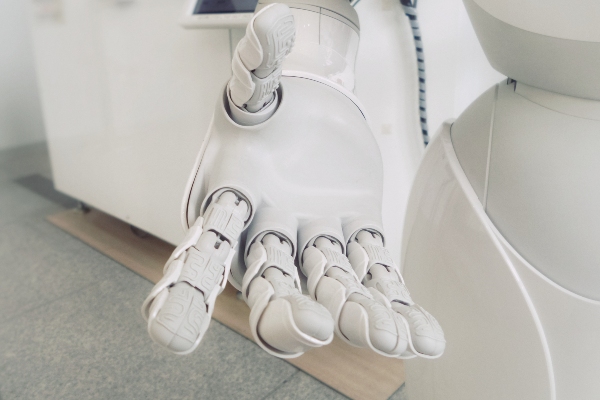
Artificial Intelligence in Engineering: Where are We Now?
The main way that artificial intelligence is impacting engineering at the moment is that it’s being integrated into more and more kinds of technology developed by people in the industry. Engineers are responsible for coming up with ways that AI might be used in the products they are designing or refining, and then implementing this to create new ‘smart’ products or intuitive devices.
A great example of this that is particularly relevant to our candidates and clients is the use of AI in transport, such as self-driving cars. This isn’t a kind of technology that is widely avoidable for public use just yet, but it’s growing more and more reliable and is likely to become the norm in the transport industry over the next decade.
Another example from the electronics and embedded systems sector is devices that use features like Amazon’s Alexa, Apple’s Siri and Google’s Google Assistant. Whether on a smartphone or as part of a household device like a speaker or a tablet, these types of AI have become incredibly commonplace in plenty of homes and are likely to become more developed and capable of complex tasks in the near future.
A lot of CAD software also uses AI, often in ways that are so subtle that you might not realise it. But the way that engineering designs and diagrams are drawn up digitally is helped massively by AI technology that makes it easy to draw common shapes, add established components and edit designs faster thanks to intuitive software.
Automation has also become a key part of many engineering manufacturing processes, many of which have come from the automation and control systems sector of the industry. Warehouses and production lines are increasingly replacing human workers with machines and robots that can carry out repetitive and sometimes dangerous tasks much faster and safer, massively improving the quality of manufacturing and the number of products that can be built.
An engineering innovation that is linked to this is collaborative robots, or ‘cobots’ which work in tandem with a human to help them complete tasks or partly automate a process. This kind of AI is particularly relevant when we’re talking about how engineering may be affected by this developing technology, examining how processes can be optimised whilst still requiring some human input.
Engineering is an interesting industry to examine the idea of artificial intelligence replacing jobs, as it’s the engineers who are creating the technology that may one day end up replacing them. But it’s important to remember that, whilst the advancements being made by robotics engineers and software developers are particularly impressive, AI that is capable of properly taking over an engineering role is still a very long way off.
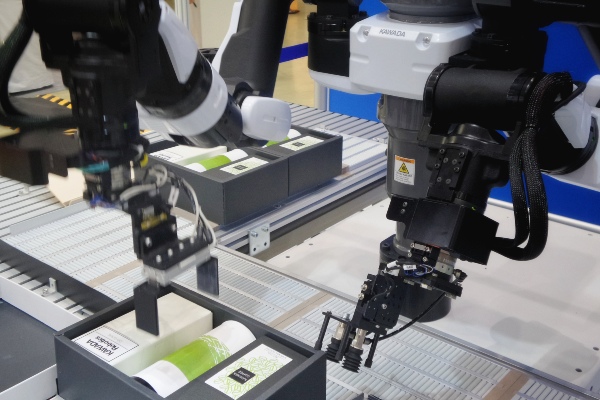
Our Insight – Will AI Replace Engineers?
When it comes to questions such as ‘will software engineers be automated?’ or ‘will AI replace programmers?’, our answer is that we don’t believe that these kinds of jobs can ever be totally replaced by artificial intelligence. In the future, machine learning will be used not to replace the role of an engineer, but to enhance their ability to do their job and create more opportunities for innovation.
There are already plenty of instances of how this is currently being done in the engineering industry, with the cobots we discussed earlier a prime example of how robotics technology can enhance established engineering processes. In the future, there will likely be more and more tools and programs developed that will allow engineers to work smarter and faster, potentially with the assistance of fully artificially intelligent machines.
What’s important to remember in discussions around artificial intelligence replacing jobs is that there are elements of engineering that machines will likely never be able to learn and replicate in the exact same way. A robot might produce an innovative idea by chance after churning out hundreds of useless ones, whereas the human brain is capable of much more nuanced and creative thinking that will always be valuable and able to come up with unique solutions and concepts.
Many engineering roles also involve interaction with other team members, stakeholders and clients, which require a level of social intelligence that AI just isn’t capable of at the moment. Even if more of the practical tasks that engineers are responsible for are eventually taken over by machines, things like pitching ideas, negotiating briefs, presenting products and collaborative problem-solving will always be better left to real people.
It’s understandable that some engineers are wary of the changes that robots and AI might bring to the industry, but resisting the coming changes will most likely mean you miss out on the benefits of what this kind of technology can do. Therefore, our advice for those impacted by artificial intelligence in engineering is to make the most of how machine learning can help you in your role and be ready to adapt to new ideas.
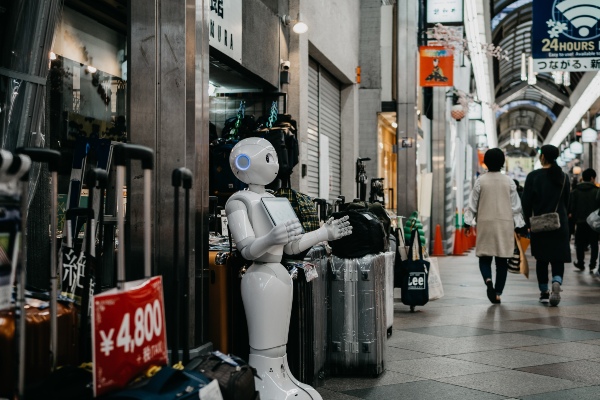
Top Tips for Working with Artificial Intelligence
Appreciate the Potential for New Technology
Our first piece of advice for working with artificial intelligence in the engineering industry is to appreciate the potential that this new technology has. As part of this, you should be willing to learn more about AI and its applications instead of just dismissing it and avoiding having to engage.
Once you start to understand the huge range of AI applications, you’re likely to realise the multitude of benefits that this technology brings and the ways that it could help improve your experiences of your job. Don’t be resistant; prepare yourself through research and discussion so that you see opportunities for AI input across your job.
Be Ready to Learn New Skills
With new technology comes a necessary need for new skills. If AI machinery is being introduced into your workplace, you’ll need to learn how to use this in order to get the most out of the experience.
Learning new skills and becoming comfortable with new technology is actually a massive benefit to you as an engineering candidate, so you should seize these opportunities and appreciate how they make you more desirable as an employee. AI technology is only going to advance in the engineering industry, and if you’re already skilled in working with it then you’re going to see a lot more job prospects opening up in the future.
Optimise Existing Procedures
When it comes to actually introducing AI into your workplace, starting small is the best approach if you want to avoid overwhelming the workforce or disrupting an established process. The best way to approach this, therefore, is to identify existing procedures that might benefit from being optimised and then look into the AI potential of these.
It might not seem like optimising established procedures will make much of a difference, but if you utilise AI technology and automate or simplify lots of processes, you’ll start to notice the impact it has on efficiency and productivity. This then leads to our next point about what this can facilitate.
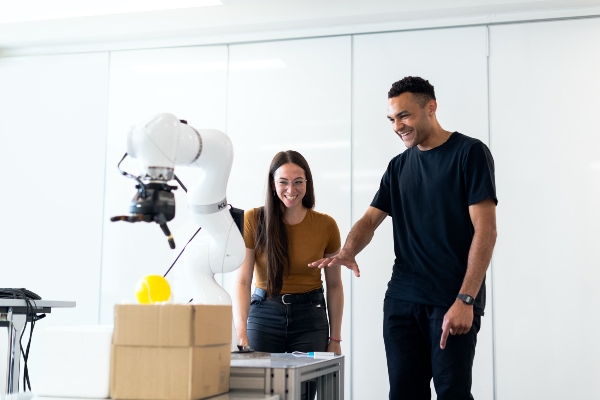
Free Up Time for Creative Work
When menial, repetitive or straightforward tasks can be taken over by automated systems and AI, engineers are likely to find that they have more time on their hands that has been freed up by certain processes becoming more efficient. This is a really exciting outcome, as it frees up more time that can be spent on creative work.
As AI technology is used more widely, there will be an increased demand for technology that uses it. Therefore, engineers can use the time they gain from allocating tasks to machines to think about new ways in which machine learning might be applied to their area of expertise, or just enjoy having more time to focus on innovative ideas and more dynamic tasks.
This is a benefit for the businesses that use this technology as well, as their workforce will come up with more ideas that can be developed into new products and solutions and then sold.
Enhance Recruitment
Finally, an area of the engineering industry where AI can be really successfully used is recruitment. There are already a lot of tools on the market that use some form of AI technology to streamline the recruitment process and help employers find talented candidates faster, as well as improve how candidates are screened and matched with the right roles. Whilst some aspects of recruitment will always be better left to real people, AI can be a brilliant addition to certain areas of recruitment, helping engineering businesses to improve their workforce and increase success.
Summary
So, is engineering safe from AI? Will AI take over engineering jobs, and does the development of new technology mean we should worry about things like ‘Can ChatGPT replace programmers’?
The bottom line of this article is that engineering is not one of the jobs that will be replaced by AI, but it is a role that can be greatly enhanced through collaboration with automated machinery and AI technology. No matter your industry sector, it is likely that AI and future jobs will start to change the way you work in the coming decade, and it’s much better to be prepared and excited about the potential that this has than daunted by the prospect.
If you’re an engineer that wants to work with AI in the electronics and embedded systems industry, KO2 is a specialist recruitment agency that can find the ideal job for you. Take a look at our available opportunities, or get in touch and speak to our team about how we can help.


